Continuum Studies in Religion and Political Culture
In recent years the study of the nature and function of religion with respect to politics has seen enormous changes. This important series provides a range of books devoted to furthering this study, and aimed at those studying and researching in this area across both disciplines.
Titles in this series look specifically at the relationship between religion and political culture. Drawing upon a broad range of religious perspectives the series is open for studies of historical as well as current phenomena in political culture. It seeks not only to inform but to provoke debate at a time when religion is gaining increasing prominence in the public realm.
The two co-directors of the Centre for Religion and Political Culture, Professor Graham Ward and Dr. Michael Hoelzl edit this series with Continuum in order to disseminate research work undertaken and to provide a publishing platform for junior as well as senior academics whose research is in religion and political culture. See Continuum Studies in Religion and Political Culture for more information, or email us directly by clicking here.
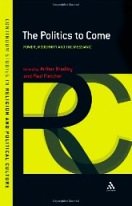 Short description of The Politics to Come: Power, Modernity and the Messianic edited by Arthur Bradley and Paul Fletcher: This title brings together an international collection of thinkers to consider the meaning of liberal democratic modernity at a moment when its future has never been less certain. It examines the explosive threats the liberal order confronts today: financial meltdown, religious extremism, environmental catastrophe. Yet, it also seeks to place these - singularly modern - crises within a much longer history. For the contributors to this collection, it is the ancient religious tradition called 'the messianic' that provides the critical lens through which modernity may be interrogated. In its ongoing struggles with the messianic, liberal modernity confronts the promise and threat of a radically new Politics to Come.
Short description of The Politics to Come: Power, Modernity and the Messianic edited by Arthur Bradley and Paul Fletcher: This title brings together an international collection of thinkers to consider the meaning of liberal democratic modernity at a moment when its future has never been less certain. It examines the explosive threats the liberal order confronts today: financial meltdown, religious extremism, environmental catastrophe. Yet, it also seeks to place these - singularly modern - crises within a much longer history. For the contributors to this collection, it is the ancient religious tradition called 'the messianic' that provides the critical lens through which modernity may be interrogated. In its ongoing struggles with the messianic, liberal modernity confronts the promise and threat of a radically new Politics to Come.
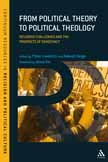 Short description of From Political Theory to Political Theology edited by Peter Losonczi and Aakash Singh: During the last two decades we have witnessed what José Casanova has characterised as “religion going public”. This has not been a trend exclusive to traditionally religious nations. Rather, it has been visible in as diverse environments as that of the construction of the new Russian political identity or in the “post-9/11” political discourses of the USA. Surprisingly, important religious manifestations also influenced the political discourses in Britain and, more recently, in France. Partly as a consequence of these phenomena an intensive debate is now evolving about the compatibility of the neutrality of liberal democracy in relation to religiously motivated opinions in public discourses, and the conditions under which such religiously driven contributions could viably “go public”.
Short description of From Political Theory to Political Theology edited by Peter Losonczi and Aakash Singh: During the last two decades we have witnessed what José Casanova has characterised as “religion going public”. This has not been a trend exclusive to traditionally religious nations. Rather, it has been visible in as diverse environments as that of the construction of the new Russian political identity or in the “post-9/11” political discourses of the USA. Surprisingly, important religious manifestations also influenced the political discourses in Britain and, more recently, in France. Partly as a consequence of these phenomena an intensive debate is now evolving about the compatibility of the neutrality of liberal democracy in relation to religiously motivated opinions in public discourses, and the conditions under which such religiously driven contributions could viably “go public”.
This book offers a collection of essays on Religion and Democracy which critically discusses the most important questions that characterize these debates at the points of their intersection within political theory, political theology and the philosophy of religion, and considers both the challenges and the prospects of this new era which, following Habermas, one may call post-secular.
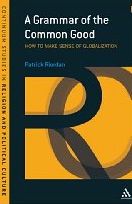 Short description of Grammar of the Common Good: Speaking of Globalization by Patrick Riordan: Globalization: the catch-all term used to refer to a complex reality whereby humanity faces global challenges to do with a shared environment - global warming, a global economic order in the absence of significant global governance, international institutions which lack independence from the member states which comprise them, and the possibility of violence, whether using a car- or plane-bomb or nuclear weapons, in the name of whatever cause. Such realities raise major questions about the intellectual and moral resources available to humanity to deal with the challenges posed, and the topic of the common good has enjoyed an explosion of interest recently in various disciplines and in different areas of life.
Short description of Grammar of the Common Good: Speaking of Globalization by Patrick Riordan: Globalization: the catch-all term used to refer to a complex reality whereby humanity faces global challenges to do with a shared environment - global warming, a global economic order in the absence of significant global governance, international institutions which lack independence from the member states which comprise them, and the possibility of violence, whether using a car- or plane-bomb or nuclear weapons, in the name of whatever cause. Such realities raise major questions about the intellectual and moral resources available to humanity to deal with the challenges posed, and the topic of the common good has enjoyed an explosion of interest recently in various disciplines and in different areas of life.
Patrick Riordan's timely study analyzes the concept of the common good as it is used in debates within political philosophy, economics, theology and most recently globalization, clarifying distinctions in definition and offering clarity and precision for a common language appropriate to debates on globalization.
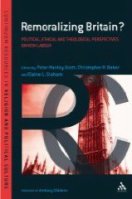 Short description of Remoralising Britain edited by Elaine L. Graham, Christopher Baker, and Peter Manley Scott: On seeking office and in coming to power, New Labour presented its vision for Britain in moral terms. During the course of the New Labour administration, further moral themes have been introduced: responsibility and respect, the merits of local government and self-governance, and the moral imperative to confront threats of 'terror' from abroad. This moral agenda, with its apparently religious roots, has been much noted, but not much discussed. The political phenomenon of New Labour requires the disciplines of theology and ethics, as well as social theory and politics, to be properly understood and assessed. Drawing together for the first time theorists from a range of disciplines and commitments, this interdisciplinary collection offers a reckoning of this New Labour decade. As such, it has four central research questions: What is the nature of this remoralising? What are its sources? How effective has it been and what difference has this moral discourse made? What can be learned from Blairism about the relationship between faith, morals and governance?
Short description of Remoralising Britain edited by Elaine L. Graham, Christopher Baker, and Peter Manley Scott: On seeking office and in coming to power, New Labour presented its vision for Britain in moral terms. During the course of the New Labour administration, further moral themes have been introduced: responsibility and respect, the merits of local government and self-governance, and the moral imperative to confront threats of 'terror' from abroad. This moral agenda, with its apparently religious roots, has been much noted, but not much discussed. The political phenomenon of New Labour requires the disciplines of theology and ethics, as well as social theory and politics, to be properly understood and assessed. Drawing together for the first time theorists from a range of disciplines and commitments, this interdisciplinary collection offers a reckoning of this New Labour decade. As such, it has four central research questions: What is the nature of this remoralising? What are its sources? How effective has it been and what difference has this moral discourse made? What can be learned from Blairism about the relationship between faith, morals and governance?
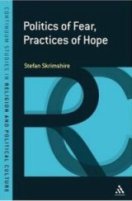 Short description of Politics of Fear, Practices of Hope by Stefan Skrimshire: Fear and hope are two hugely influential ideas in political life; here Stefan Skrimshire examines their relationship at a time where interest has exploded in the quasi-religious themes of apocalyptic protest and utopian politics.This book is about the relationship between two hugely influential ideas in political life: fear and hope. In distinction to a growing literature already grappling with these ideas, this book argues that responses to a politics of fear have coincided with an explosion of interest in the quasi-religious themes of apocalyptic protest and utopian politics in both scholarly interest and cultural and political life. As such, it makes a timely contribution to the rapidly growing study into the re-surfacing of religious reasons in our 'post secular' political culture.Whilst recent scholarly studies have drawn attention to the re-emergence of theological questions of, for example, political sovereignty; attitudes towards the body; universality; and transcendence, this book argues in addition that the subject of political orientations of the future should also be taken seriously, where political thought is engaged with theological themes such as eschatology, apocalypse and utopia, in order to generate resources for hope. In recent years the study of the nature and function of religion with respect to politics has seen enormous changes. This important series provides a range of books devoted to furthering this study, and aimed at those studying and researching in this area across both disciplines.Titles in this series look specifically at the relationship between religion and political culture. Drawing upon a broad range of religious perspectives, the series is open for studies of historical as well as current phenomena in political culture. It seeks not only to inform but to provoke debate at a time when religion is gaining increasing prominence in the public realm.
Short description of Politics of Fear, Practices of Hope by Stefan Skrimshire: Fear and hope are two hugely influential ideas in political life; here Stefan Skrimshire examines their relationship at a time where interest has exploded in the quasi-religious themes of apocalyptic protest and utopian politics.This book is about the relationship between two hugely influential ideas in political life: fear and hope. In distinction to a growing literature already grappling with these ideas, this book argues that responses to a politics of fear have coincided with an explosion of interest in the quasi-religious themes of apocalyptic protest and utopian politics in both scholarly interest and cultural and political life. As such, it makes a timely contribution to the rapidly growing study into the re-surfacing of religious reasons in our 'post secular' political culture.Whilst recent scholarly studies have drawn attention to the re-emergence of theological questions of, for example, political sovereignty; attitudes towards the body; universality; and transcendence, this book argues in addition that the subject of political orientations of the future should also be taken seriously, where political thought is engaged with theological themes such as eschatology, apocalypse and utopia, in order to generate resources for hope. In recent years the study of the nature and function of religion with respect to politics has seen enormous changes. This important series provides a range of books devoted to furthering this study, and aimed at those studying and researching in this area across both disciplines.Titles in this series look specifically at the relationship between religion and political culture. Drawing upon a broad range of religious perspectives, the series is open for studies of historical as well as current phenomena in political culture. It seeks not only to inform but to provoke debate at a time when religion is gaining increasing prominence in the public realm.
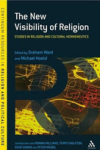 Short description of The New Visibility of Religion edited by Graham Ward and Michael Hoelzl: This is a unique collection of essays that brings together contributions from theology, aesthetics, social and political science, philosophy and cultural theory to examine the surge in the public visibility of religion.Since the late 1980s, sociologists have been drawing our attention to an international surge in the public visibility of religion. This has increasingly challenged two central aspects of modern western European culture: first, the assumption that as we became more modern we would become more secularised and religion would disappear; and secondly, that religion and politics should occupy radically differentiated spheres in which private conviction did not exert itself within the public realm. The new visibility of religion is not simply a matter of what Keppel famously called 'The Revenge of God', that is, the resurgence of Christian, Islamic and Jewish fundamentalism. Religion is permeating western culture in many different forms from contemporary continental philosophy, the arts and the media, to the rhetoric of international politicians.This collection of essays brings together a unique collection of voices from theology, aesthetics, social and political science, philosophy and cultural theory in an exploration of four major aspects of this new visibility of religion: the revision of the secularisation thesis, the relationship between religion and violence, the new re-enchantment of reality and the return of metaphysics.
Short description of The New Visibility of Religion edited by Graham Ward and Michael Hoelzl: This is a unique collection of essays that brings together contributions from theology, aesthetics, social and political science, philosophy and cultural theory to examine the surge in the public visibility of religion.Since the late 1980s, sociologists have been drawing our attention to an international surge in the public visibility of religion. This has increasingly challenged two central aspects of modern western European culture: first, the assumption that as we became more modern we would become more secularised and religion would disappear; and secondly, that religion and politics should occupy radically differentiated spheres in which private conviction did not exert itself within the public realm. The new visibility of religion is not simply a matter of what Keppel famously called 'The Revenge of God', that is, the resurgence of Christian, Islamic and Jewish fundamentalism. Religion is permeating western culture in many different forms from contemporary continental philosophy, the arts and the media, to the rhetoric of international politicians.This collection of essays brings together a unique collection of voices from theology, aesthetics, social and political science, philosophy and cultural theory in an exploration of four major aspects of this new visibility of religion: the revision of the secularisation thesis, the relationship between religion and violence, the new re-enchantment of reality and the return of metaphysics.
The exploration is conducted through essays by and interviews with figures at the forefront of reflecting upon this major cultural shift and its implications. It is distinctively multidisciplinary, examining the phenomenon of the rise of religion in Western Europe from a number of interrelated perspectives.In recent years the study of the nature and function of religion with respect to politics has seen enormous changes. This important series provides a range of books devoted to furthering this study, and aimed at those studying and researching in this area across both disciplines.Titles in this series look specifically at the relationship between religion and political culture. Drawing upon a broad range of religious perspectives, the series is open for studies of historical as well as current phenomena in political culture. It seeks not only to inform but to provoke debate at a time when religion is gaining increasing prominence in the public realm.
